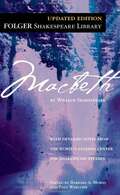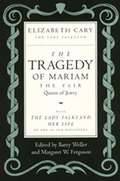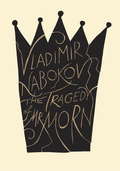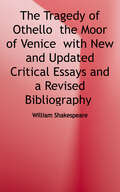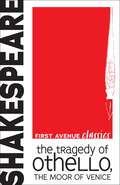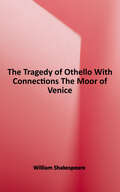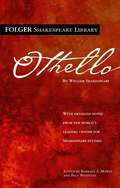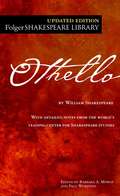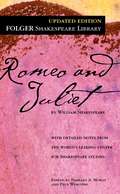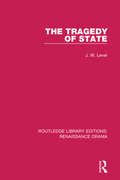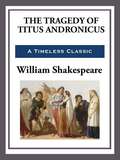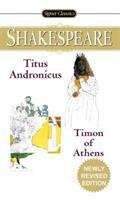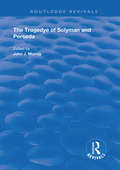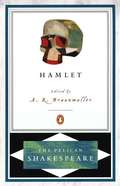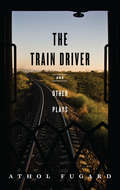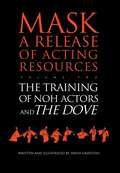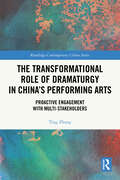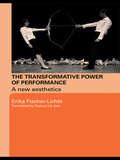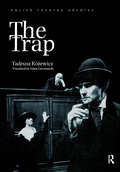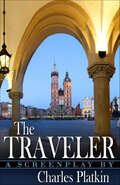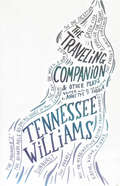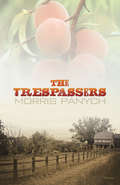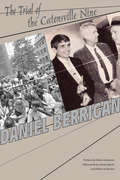- Table View
- List View
The Tragedy of Macbeth (The Folger Shakespeare Library)
by William Shakespeare Barbara A. Mowat Paul WerstineThis edition makes the plays and poems of Shakespeare fully understandable for modern readers using uncompromising scholarship. Professors Barbara Mowat and Paul Werstine have produced this New Folger Shakespeare for a new generation of readers.
The Tragedy of Mariam, The Fair Queen of Jewry with The Lady Falkland, Her Life
by Elizabeth Cary Lady Falkland Barry Weller Margaret W. FergusonThe Tragedy of Mariam (1613) is the first original play by a woman to be published in England, and its author is the first English woman writer to be memorialized in a biography, which is included with this edition of the play. With this textually emended and fully annotated edition, the play will now be accessible to all readers. The accompanying biography of Cary further enriches our knowledge of both domestic and religious conflicts in the seventeenth century.
The Tragedy of Mister Morn
by Vladimir Nabokov Thomas Karshan Anastasia TolstoyFor the first time in English, Vladimir Nabokov's earliest major work, written when he was only twenty-four: his only full-length play, introduced by Thomas Karshan and beautifully translated by Karshan and Anastasia Tolstoy. The Tragedy of Mister Morn was written in the winter of 1923-1924, when Nabokov was completely unknown. The five-act play--the story of an incognito king whose love for the wife of a banished revolutionary brings on the chaos the king has fought to prevent--was never published in Nabokov's lifetime and lay in manuscript until it appeared in a Russian literary journal in 1997. It is an astonishingly precocious work, in exquisite verse, touching for the first time on what would become this great writer's major themes: intense sexual desire and jealousy, the elusiveness of happiness, the power of the imagination, and the eternal battle between truth and fantasy. The play is Nabokov's major response to the Russian Revolution, which he had lived through, but it approaches the events of 1917 above all through the prism of Shakespearean tragedy.
The Tragedy of Othello the Moor of Venice: With New and Updated Critical Essays and a Revised Bibliography (Signet Classics Ser.)
by William ShakespeareThe Signet Classics edition of William Shakespeare's Othello, a disturbing exploration of jealousy and wrath. Tragedy takes hold as the cunning and hateful Iago drives the heroic Moor of Venice first to suspicion, then to homicidal rage against his love Desdemona, in one of the Bard's darkest plays. This revised Signet Classics edition includes unique features such as-. An overview of Shakespeare's life, world, and theater -A special introduction to the play by the editor, Alvin Kernan - Selections from Giraldi Cinthio's Hecatommithi, the source from which Shakespeare drived Othello - Dramatic criticism from Samuel Taylor Coleridge, Maynard Mack, and others - A comprehensive stage and screen history of notable actors, directors, and productions - Text, notes, and commentaries printed in the clearest, most readable text - And more...
The Tragedy of Othello, the Moor of Venice: Edited, With Notes (classic Reprint) (First Avenue Classics ™)
by William ShakespeareOthello, a general in the Venetian army, has married the lovely Desdemona, and Roderigo is not at all happy. He was hoping to woo Desdemona for himself. Roderigo's jealousy is all Iago, Roderigo's sneaky friend, needs, as he has his own reasons to be angry with Othello. By weaving an intricate web of deceit, infidelity, and envy, Iago is able to plant false suspicions and lead people to commit crimes that will destroy the relationships dearest to them. This is an unabridged version of one of William Shakespeare's most famous tragedies, first published in England in 1622.
The Tragedy of Othello: The Moor of Venice (Bantam Classic)
by William Shakespeare David Scott KastanThough this great tragedy of unsurpassed intensity and emotion is played out against Renaissance splendor, its story of the doomed marriage of a Venetian senator's daughter, Desdemona, to a Moorish general, Othello, is especially relevant to modern audiences. The differences in race and background create an initial tension that allows the horrifyingly envious villain Iago methodically to promote the "green-eyed monster" jealousy, until, in one of the most deeply moving scenes in theatrical history, the noble Moor destroys the woman he loves only to discover too late that she was innocent. Each Edition Includes: - Comprehensive explanatory notes - Vivid introductions and the most up-to-date scholarship - Clear, modernized spelling and punctuation, enabling contemporary readers to understand the Elizabethan English - Completely updated, detailed bibliographies and performance histories - An interpretive essay on film adaptations of the play, along with an extensive filmography From the Paperback edition.
The Tragedy of Othello: The Moor of Venice (The Folger Shakespeare Library)
by William Shakespeare Barbara A. Mowat Paul WerstineDesigned to make Shakespeare's great plays available to all readers, the New Folger Library edition of Shakespeare's plays provides accurate texts in modern spelling and punctuation, as well as scene-by-scene action summaries, full explanatory notes, many pictures clarifying Shakespeare's language, and notes recording all significant departures from the early printed versions. Each play is prefaced by a brief introduction, by a guide to reading Shakespeare's language, and by accounts of his life and theater. Each play is followed by an annotated list of further readings and by a "Modern Perspective" written by an expert on that particular play.
The Tragedy of Othello: The Moor of Venice (The Folger Shakespeare Library)
by William Shakespeare Barbara A. Mowat Paul WerstineIn addition to exhibitions open to the public throughout the year, the Folger offers a full calendar of performances and programs. Each edition includes: Freshly edited text based on the best early printed version of the play. Full explanatory notes conveniently placed on pages facing the text of the play. Scene-by-scene plot summaries A key to famous lines and phrases. An introduction to reading Shakespeare's language. An essay by an outstanding scholar providing a modern perspective on the play. Illustrations from the Folger Shakespeare Library's vast holdings of rare books Essay by Susan Snyder The Folger Shakespeare Library in Washington, D. C. , is home to the world's largest collection of Shakespeare's printed works, and a magnet for Shakespeare scholars from around the globe.
The Tragedy of Romeo and Juliet (The Folger Shakespeare Library)
by William Shakespeare Barbara A. Mowat Paul WerstinePresents the original text of Shakespeare's play side by side with a modern version, discusses the author and the theater of his time, and provides quizzes and other study activities.
The Tragedy of State (Routledge Library Editions: Renaissance Drama Ser.)
by J. W. LeverThe domination of the state over the lives of individuals is, arguably, a problem of the present-day world. In this book, first published in 1971, the author finds essentially the same problem in Jacobean tragedy in the shape it assumed during the rise of the first European nation-states. The English dramatists of the early seventeenth century a
The Tragedy of Titus Andronicus
by William ShakespeareTitus Andronicus may be Shakespeare's earliest tragedy; it is believed to have been written sometime between 1584 and the early 1590s. It depicts a Roman general who is engaged in a cycle of revenge with his enemy Tamora, the Queen of the Goths. The play is by far Shakespeare's bloodiest work. It lost popularity during the Victorian era because of its gore, and has only recently begun to revive its fortunes.
The Tragedy of Titus Andronicus: The Life of Timon of Athens
by William ShakespeareAs part of the Signet Classics Shakespeare Series edited by Sylvan Barnet of Tufts University, this edition includes commentaries on both plays as well as up-to-date production histories.
The Tragedye of Solyman and Perseda: Edited from the Original Texts with Introduction and Notes (Routledge Revivals)
by John J. MurrayPublished in 1991 The Tragedye of Solyman and Perseda is a late Elizabethan romantic tragedy by Thomas Kyd, author of The Spanish Tragedy. It dramatises the triangular relationship of the Turkish emperor Soliman, his captive Perseda and her beloved Erastus against the fictionalised backdrop of the Turkish invasion of Rhodes in the early sixteenth century. This volume contains the original text along with textual and critical notes.
The Tragical History of Hamlet Prince of Denmark
by William Shakespeare A. R. BraunmullerHamlet, Prince of Denmark is faced by a ghost bearing a grim message of murder and revenge, driving the prince to the edge of madness by his struggle to understand the situation and to do his duty.
The Train Driver and Other Plays
by Athol Fugard"For me [The Train Driver] is the biggest of them all. Everything I have written before has been a journey to this."-Athol Fugard"A dramatic, moving theater experience written for South Africa. . . . It will save us from hopelessness. See it."-Sunday IndependentThe Train Driver is classic Athol Fugard, and one of his most important plays. The playwright, known throughout the world as a chronicler of his native South Africa's apartheid past, directed its premiere at the newly opened Fugard Theater in one of Cape Town's most politically contentious areas. This seminal work was inspired by the true story of a mother who, with her three children, committed suicide on the train tracks in Cape Town. The two-person drama unfolds between the train's engineer and the grave digger who buries "the ones without names." This edition also includes Coming Home, Fugard's first work addressing AIDS in South Africa, and Have You Seen Us? his first play set in America, about a South African transplanted to San Diego, where the playwright currently resides.Athol Fugard's works includes Blood Knot, Master Harold. . .and the Boys, Boesman and Lena, Sizwe Banzi is Dead and My Children! My Africa! He has been widely produced in South Africa, London, on Broadway, and across the United States.
The Training of Noh Actors and The Dove (Mask - A Release Of Acting Resources Ser. #Vol. 2)
by David GriffithsFirst Published in 1998. Routledge is an imprint of Taylor & Francis, an informa company.
The Transformational Role of Dramaturgy in China’s Performing Arts: Proactive Engagement with Multi-Stakeholders (Routledge Contemporary China Series)
by Ting ZhangA pioneering examination of a field in its early stages, Zhang delves into a detailed exploration of the evolving role of dramaturgy in contemporary Chinese theatre, bridging the gap between established Western theories and the unique practices emerging in the Chinese theatre scene, and offering valuable insight into the reshaping of theatre production amidst a rapidly changing cultural landscape.Compared with the development of dramaturgy in Western countries, dramaturgical practice in contemporary Chinese theatre is still in its infancy. This book aims to fill this gap by exploring dramaturgy’s evolution and current role in Chinese theatre. It embarks on a global exploration—in terms of both dramaturgical theories and practices—across Germany, the UK, the US, and the Asia-Pacific region, providing a theoretical framework. It then traces the evolution of Chinese spoken drama (Huaju) from its origins in 1907 to the present. This chronological exploration illuminates Huaju’s development from foreign influences in the early decades to a more recent era of self-exploration. The book features three key case studies: the reception of Henrik Ibsen’s work in China, the 1983 production of Arthur Miller’s Death of a Salesman in Beijing, and the writing and staging of Teahouse. It also explores contemporary dramaturgical practices in China, based on fieldwork and interviews with theatre practitioners in Beijing and Shanghai. Through an examination of the similarities and differences in dramaturgical practices across performing arts in China, the book firmly positions Chinese dramaturgy within the broader currents of global theatre discourse.This book is a unique cross-cultural resource with practical insights and theoretical reflections of great value for academics, scholars, educators, and practitioners in the fields of theatre studies, dramaturgy, cross-cultural performance studies, contemporary Chinese theatre, and the global evolution of dramaturgy.
The Transformative Power of Performance: A New Aesthetics
by Erika Fischer-LichteIn this book, Erika Fischer-Lichte traces the emergence of performance as 'an art event' in its own right. In setting performance art on an equal footing with the traditional art object, she heralds a new aesthetics. The peculiar mode of experience that a performance provokes – blurring distinctions between artist and audience, body and mind, art and life – is here framed as the breeding ground for a new way of understanding performing arts, and through them even wider social and cultural processes. With an introduction by Marvin Carlson, this translation of the original Ästhetik des Performativen addresses key issues in performance art, experimental theatre and cultural performances to lay the ground for a new appreciation of the artistic event.
The Trap
by Tadeusz RosewiczFirst Published in 1998. Routledge is an imprint of Taylor & Francis, an informa company.
The Traveler: A Screenplay
by Charles PlatkinCNN travel reporter Seth Thomas is renowned for his rich and detailed articles and guidebooks. But he has an embarrassing secret that could ruin his career. He's never traveled a day in his life. That is, until circumstances lead him to become entangled with the mysterious and sexy Jerico, and he is forced to finally board a plane that will take him to Eastern Europe where an art heist in Poland has just occurred.THE TRAVELER is a four-act screenplay from author Charles Platkin.
The Traveling Companion & Other Plays
by Annette J. Saddik Tennessee WilliamsTwelve previously uncollected experimental shorter plays: The Chalky White Substance * The Day on Which a Man Dies (An Occidental Noh Play) * A Cavalier for Milady * The Pronoun "I" * The Remarkable Rooming House of Mme. LeMonde * Kirche, Küche, Kinder (An Outrage for the Stage) * Green Eyes * The Parade * The One Exception * Sunburst * Will Mr. Merriwether Return from Memphis? * The Traveling Companion Even with his great commercial success, Tennessee Williams always considered himself an experimental playwright. In the last 25 years of his life his explorations increased--especially in shorter forms and one-act plays--as Williams created performance pieces with elements of theater of the absurd, theater of cruelty, theater of the ridiculous, as well as motifs from Japanese forms such as Noh and Kabuki, high camp and satire, and with innovative visual and verbal styles that were entirely his own. Influenced by Beckett, Genet, and Pinter, among others, Williams worked hard to expand the boundaries of the lyric realism he was best known for. These plays were explicitly intended to be performed off-off Broadway or regionally. Sometimes disturbing, sometimes outrageous, quite often the tone of these plays is rough, bawdy or even cartoonish. While a number of these plays employ what could be termed bizarre "happy endings," others gaze unblinkingly into the darkness. Though several of Williams' lesser-known works from this period have already been published by New Directions, these twelve plays have never been collected. Most of these shorter plays are unknown to audiences and scholars--some are published here for the first time--yet all of them embrace, in one way or another, what Time magazine called "the four major concerns that have spurred Williams' dramatic imagination: loneliness, love, the violated heart and the valiancy of survival."
The Trespassers
by Morris PanychLowell is no average teenager-and his grandfather, Hardy, is no conventional role model. Hardy may once have owned the abandoned orchard at the heart of town where they spend time trespassing and discussing ethics as if it were nothing more than a game. When inspector Milton shows up to investigate a murder, Lowell's truths are put to the ultimate test.
The Trial of the Catonsville Nine
by Daniel BerriganOn May 17, 1968, at the height of the Vietnam War, nine men and women entered a Selective Service office outside Baltimore. They removed military draft records, took them outside, and set them afire with napalm. The Catholic activists involved in this protest against the war included Daniel and Philip Berrigan; all were found guilty of destroying government property and sentenced to three years in jail. Dan Berrigan fled but later turned himself in.The Trial of the Catonsville Nine became a powerful expression of the conflicts between conscience and conduct, power and justice, law and morality. Drawing on court transcripts, Berrigan wrote a dramatic accountof the trial and the issues it so vividly embodied. The result is a landmark work of art that has been performed frequently over the past thirty-five years, both as a piece of theater and a motion picture.
